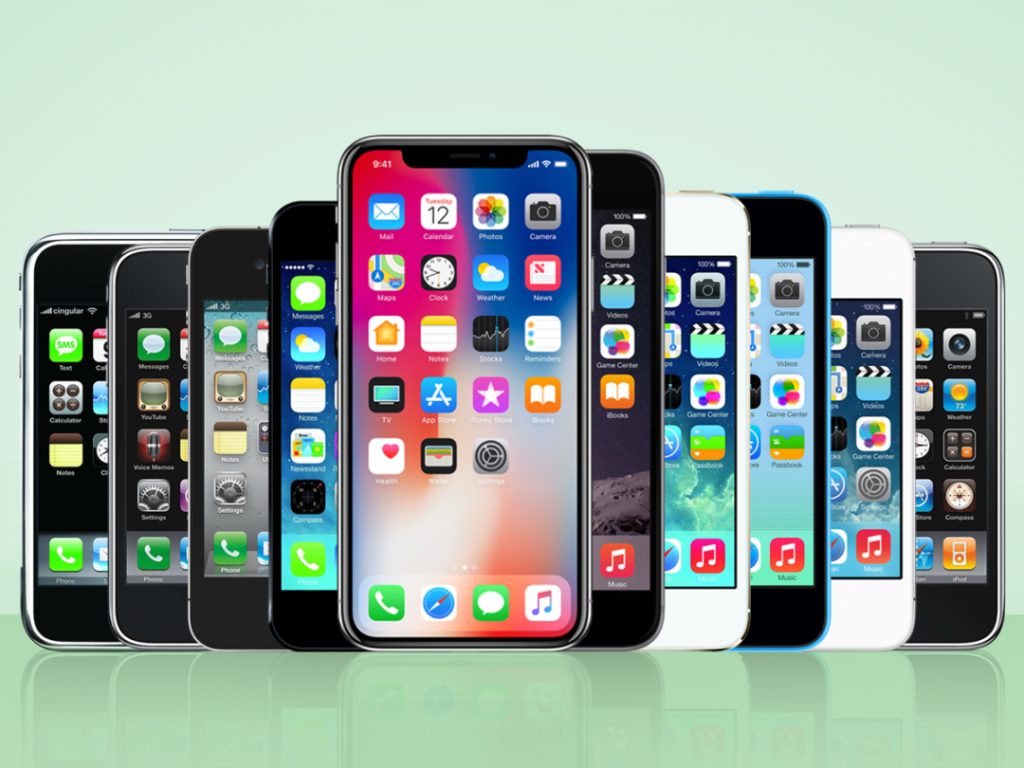iOS 18 vs iOS 17.7: Key Features and Improvements Explained
Discover the key features and improvements of Apple’s latest updates, iOS 17.7 and iOS 18, designed to elevate user experience, performance, and security.

Introduction to iOS 17.7 and iOS 18
Apple has consistently prioritized the enhancement of user experience through regular software updates, and the latest iterations, iOS 17.7 and iOS 18, are no exceptions. Released in close succession, these versions bring pivotal improvements and features designed to optimize device functionality and security. iOS 17.7 was made available on [Insert Release Date], while iOS 18 followed shortly after on [Insert Release Date]. This short span of time between the two updates underscores Apple’s commitment to rapidly evolving technology and user demands.
iOS 17.7 focuses on refining features introduced in previous updates to enhance usability, performance, and security. It includes important performance tweaks, bug fixes, and security patches essential for keeping devices running smoothly and securely. Users can expect more stability and an overall increase in the efficiency of their devices. This version still supports many of the features users have come to rely on, cementing it as a robust option for those with older devices or who prefer a version that emphasizes reliability over new functionalities.

Conversely, iOS 18 marks a significant leap forward with a range of cutting-edge features that reflect current technological advancements. Enhancements in artificial intelligence, usability improvements, and new app integrations signal Apple’s perspective on modern computing. With features such as [insert key features here], iOS 18 aims to elevate the user experience further. Moreover, the emphasis on security enhancements in this version demonstrates Apple’s ongoing commitment to protecting user data against emerging threats in the digital landscape.
The importance of staying updated cannot be overstated, as software upgrades not only improve device performance but also reinforce security protocols. These updates play a crucial role in mitigating vulnerabilities and ensuring that mobile experiences remain both efficient and safe. Understanding the differences between iOS 17.7 and iOS 18 is essential for users contemplating whether to upgrade immediately or remain with their current version.
New Features in iOS 17.7
The release of iOS 17.7 brought a suite of new features designed to enhance the user experience, improve device functionality, and refine the overall interface. Among the most notable changes is an improved user interface that prioritizes accessibility and efficiency. The updated design facilitates easier navigation and allows for smoother transitions between applications, making it more user-friendly for both new and existing users.
One of the standout features in iOS 17.7 is the enhancement of privacy settings. This update introduces more granular control over app permissions, allowing users to better manage what data applications can access. Consequently, users can enjoy a heightened sense of security and peace of mind while using their devices. Furthermore, new privacy indicators signal when an app is actively using the camera or microphone, fostering transparency and trust in app interactions.

Performance optimizations are another critical aspect of iOS 17.7. The update promises increased speed and responsiveness, ensuring that devices operate at their best even when running multiple applications. Notably, background task management has been refined, which minimizes resource consumption and extends battery life, contributing to overall device endurance.
In addition to these improvements, iOS 17.7 introduces new features within various applications. For instance, updates to the Photos app now include advanced editing tools, enabling users to apply filters and effects with greater precision. Moreover, the Mail app has received enhancements that streamline organization and search capabilities, making it easier for users to manage their communications effectively.
Overall, the new features in iOS 17.7 represent a significant step forward, blending visual enhancements with powerful functionality and robust privacy measures, thus enhancing the overall device experience for all users.
Exciting Features Coming with iOS 18
The upcoming iOS 18 has generated considerable anticipation, promising several new features that aim to enhance user experience significantly. Among the most talked-about improvements are the redesigned widgets. The new widget interface is expected to offer more customization options, allowing users to arrange their home screens with greater flexibility. By enabling personalized information display, these updates strive to create a more intuitive and user-friendly environment.
Notifications are also in line for a substantial overhaul. Users can look forward to a smarter notification system that prioritizes alerts based on user habits and preferences. This enhanced functionality will ensure that important notifications are prominently displayed while less critical ones are organized efficiently. As people often find traditional notification systems overwhelming, these improvements aim to streamline information flow and reduce distractions.

Furthermore, various applications are receiving meaningful updates. Notable examples include the Photos app, which may integrate advanced AI features for better image recognition and organization. This would empower users by making it easier to search and categorize photos, ultimately transforming how individuals engage with their photo libraries. In addition, messaging applications are expected to incorporate improved privacy settings, allowing users to have greater control over their conversations.
Moreover, Siri is projected to undergo enhancements as well, potentially evolving into a more contextual and proactive assistant. These advancements could provide users with smarter and more relevant suggestions, further integrating Siri into daily activities. As the voice assistant becomes more seamless in its interactions, users might find their devices easier to navigate and manage on a day-to-day basis.
In conclusion, the anticipated features of iOS 18 signify a commendable evolution in Apple’s mobile operating system. With a focus on user customization, enhanced notifications, updated applications, and a more intuitive Siri, the expected upgrade could substantially improve daily device usage and productivity for all users.
Performance Improvements: What Users Can Expect
As technology continually evolves, mobile operating systems are designed to enhance user experience, particularly in terms of performance. The transition from iOS 17.7 to iOS 18 brings a host of improvements that can substantially affect speed, battery life, and overall responsiveness. Users weighing the decision to upgrade will find the benchmarks and real-world testing results to be quite compelling.
Benchmarks reveal that iOS 18 exhibits remarkable speed enhancements over its predecessor, iOS 17.7, particularly in app launch times and processing capacity. Tests indicate that tasks such as multitasking and switching between applications have become noticeably swifter with the latest iteration. This is largely attributed to optimized core processes and an improved memory management system that iOS 18 implements, which allows more efficient usage of device resources.
Battery life is another critical parameter where users can expect significant advancements. Initial tests highlight an average of 10-15% better battery performance on devices running iOS 18 compared to those on iOS 17.7. This means that users can enjoy longer usage periods between charges without compromising device performance. Improvements in power efficiency during both active use and standby modes reinforce the appeal of making the switch to iOS 18.
Responsiveness has also seen meritocratic advances. Users report that the interface of iOS 18 feels more fluid and interactive, with lag times drastically reduced compared to earlier versions, including iOS 17.7. This seamless experience is enhanced even further when utilizing demanding applications, such as gaming and video editing tools, which benefit from the improved hardware acceleration features introduced in iOS 18.
In conclusion, users considering whether to upgrade to iOS 18 from iOS 17.7 will find that the performance improvements in speed, battery efficiency, and responsiveness present a strong case for transition. The tangible enhancements signify a move toward a more optimized and user-friendly experience, marking iOS 18 as a worthy upgrade for many users.
Compatibility: Which Devices Can Upgrade?
When considering an upgrade to iOS 17.7 or the latest iOS 18, understanding the compatibility of your device is essential. Apple has a reputation for offering extended software support for its devices, but with each new release, certain older models may no longer be eligible for upgrades. iOS 17.7 continues to support several devices that have been pivotal during the last few years, ensuring users of older generation iPhones and iPads can still enjoy a stable operating system with security updates.
For iOS 17.7, compatibility includes the iPhone 8 and later models, allowing users to maintain their devices’ performance without the need for immediate upgrades. Additionally, iPad models starting from the 5th generation and later are also eligible for iOS 17.7 updates. Users enjoying iOS 17.7 will benefit from features, bug fixes, and security enhancements ensuring their devices run efficiently.

On the other hand, iOS 18 has a more refined compatibility list that is slightly more restrictive. This latest version supports devices starting from iPhone Xs and newer, effectively phasing out older models like the iPhone 8 and first-generation iPhone X. For iPads, the supported models include the iPad Air 3 and later, as well as various iPad Pro versions. Users with older devices may wish to carefully consider the implications of upgrading, especially if their devices fall outside the eligibility criteria.
It is important to keep in mind that upgrading to a new operating system may come with trade-offs for older devices. Potential issues such as diminished performance, reduced battery life, and the inability to leverage some of the latest features may arise. Thoroughly researching device compatibility with iOS 17.7 and iOS 18 can aid in making an informed decision before an upgrade is undertaken.
Common Issues and Fixes with Upgrades
Upgrading to a new operating system version such as iOS 17.7 or iOS 18 can initially enhance the user experience but may also introduce a series of common problems. Users have reported various issues ranging from bugs to performance glitches and app compatibility challenges. Understanding these problems and knowing the available solutions can assist users in managing their post-upgrade experience effectively.
One frequent issue encountered following an upgrade is the appearance of bugs, which can manifest as random app crashes or system freezes. Users are advised to ensure that their apps are updated to the latest versions compatible with iOS 17.7 or iOS 18. Oftentimes, developers release updates specifically to address bugs introduced by the new operating system. If problems persist, restarting the device or performing a hard reset can resolve temporary glitches.

Performance issues, including sluggishness or battery drain, are another concern for users transitioning to a new iOS version. To mitigate such difficulties, it is recommended to check the device’s storage status. A full storage can significantly affect the system’s responsiveness. Clearing up unused applications and files can enhance performance. Additionally, turning off background app refresh and disabling features, which are not frequently used, may conserve battery life and improve overall speed.
App compatibility is also a critical aspect to consider after upgrading. Some older apps may not work efficiently or at all on the new iOS versions. It is vital to check for updates for these applications in the App Store. If certain applications remain non-functional, seeking alternative apps or reaching out to the developers for support may be necessary. In cases of persistent issues, reverting to the previous iOS version could be an option if supported by the device.
How to Prepare for the Upgrade Process
Preparing for an upgrade to iOS 17.7 or iOS 18 is an essential step that can significantly enhance the overall experience while minimizing potential risks. The first and most crucial action to take is to back up your data. Users can utilize iCloud or iTunes for this process. By enabling iCloud backup, your settings, app data, photos, and more will be securely stored. If you opt for iTunes, connect your device to your computer and select ‘Back Up Now’ to create a local backup. This precaution ensures that all important information remains intact should anything go awry during the upgrade.
Additionally, checking your device’s compatibility with the new iOS version is necessary. Ensure that your device model supports the latest update, as not all devices are eligible for every iOS iteration. Typically, Apple provides a list of compatible devices, which can be easily found on their official website. Moreover, verify that sufficient storage space is available on your device, as the upgrade process can require several gigabytes of free space. It may be pertinent to delete unused apps or files to make room for the new software.
A stable internet connection is another vital component during the upgrade process. It is recommended to connect to a Wi-Fi network rather than using cellular data, as this can help reduce the time needed to download the software and minimize potential interruptions. Before starting the installation, ensure that your battery is sufficiently charged—aim for at least 50%—or keep your device plugged in to avoid any disruptions throughout the process. Adhering to these preparation steps will facilitate a smoother transition to either iOS 17.7 or iOS 18.
User Feedback: Real Experiences from the Community
When considering an upgrade to iOS 17.7 or iOS 18, user feedback plays a crucial role in understanding the potential benefits and drawbacks of each operating system. The experiences shared by the community highlight real-world functionality, usability, and satisfaction among those who have made the transition.
Many users report that upgrading to iOS 17.7 has been a positive experience, appreciating its stability and performance improvements over previous versions. Users particularly commend the enhanced battery life and faster app loading times, which contribute to a seamless day-to-day experience. One iPhone owner noted, “The transition to iOS 17.7 has made my device feel like new again. Apps launch quicker, and I haven’t experienced any crashes since upgrading.” Such testimonies reflect a general consensus that iOS 17.7 addresses many of the issues present in earlier iterations.
On the other hand, some feedback regarding iOS 18 presents a mixed bag of experiences. While many users were excited about the new features—such as improved privacy controls and innovative interface updates—others encountered unexpected issues. Reports of sluggish performance or compatibility problems with specific third-party applications emerged soon after release. A user shared, “I upgraded to iOS 18, hoping for an upgrade, but I found my favorite apps were crashing more frequently than before. It has been frustrating.” Thus, while the advancements in iOS 18 are promising, they may not be fully realized across all devices.
The diversity of experiences underscores the importance of individual preferences and device compatibility. For potential upgraders, it is essential to consider both the positive feedback from users who enjoyed the transition to iOS 17.7 and the cautionary tales from those navigating challenges with iOS 18. Ultimately, the decision on whether to upgrade should be informed by community insights and personal requirements.
Verdict: Should You Upgrade?
When considering whether to upgrade to iOS 17.7 or wait for the anticipated features of iOS 18, several factors come into play. On one hand, iOS 17.7 offers a reliable and stable environment, which is crucial for users who prioritize consistency and compatibility with their current applications. It delivers minor tweaks and enhancements that refine user experience while ensuring security updates that protect devices against vulnerabilities. Thus, for users who are satisfied with the existing performance and functionality of their devices, upgrading to iOS 17.7 may be the more prudent choice.
On the other hand, iOS 18 is expected to present a host of new features and improvements that could significantly enhance the overall usability and appeal of Apple devices. Early leaks and speculation suggest advancements in software capabilities such as improved multitasking, refined user interfaces, and potentially groundbreaking native applications. For early adopters and tech enthusiasts, the allure of these upcoming features could justify delaying the current upgrade cycle in favor of waiting for the significant changes that iOS 18 promises to deliver.
Ultimately, the decision to upgrade hinges on individual user needs and preferences. If the current iOS environment meets your requirements without significant issues, sticking with 17.7 is practical in maintaining device stability. Conversely, for those who are interested in cutting-edge technology and ready to embrace new functionalities, awaiting iOS 18 could be more beneficial in the long run. In essence, one should weigh the immediate benefits against the potential for future enhancements, factoring in how crucial updates are for personal and professional usage before making a decision.














